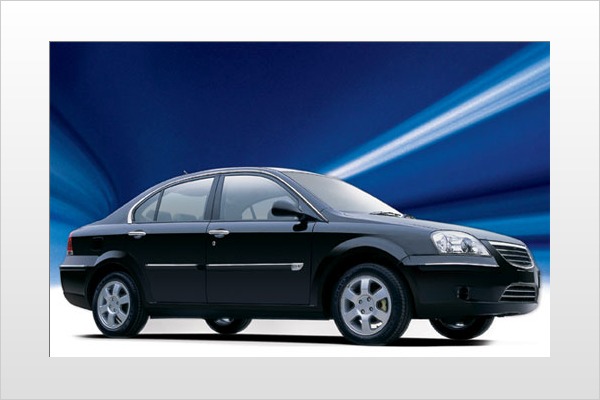
The way they tell it, Miles Rubin was at a conference listening to a speaker describe how wonderful hydrogen cars will be — when they are introduced 18 years from now. Rubin leaned over to an associate and whispered, "I'll be dead in 18 years — what can we do in 18 months?"
That happened back in 2004 and spawned the creation of the Miles Automotive Group, named for Miles Rubin, once the CEO of Polo/Ralph Lauren Jeans Company and a longtime entrepreneur and philanthropist. The young company cut its teeth on low-speed electric cars, creating three models now in use on college campuses. But in late 2008, Miles will release a highway-speed electric passenger car powered by lithium-ion batteries.
Who's on First?
Miles' XS500, designed by Pininfarina, is not technically the first on the market. Tesla Motors plans to release a lithium-ion battery-powered sports car later this year, but it has been delayed several times. Phoenix Motorcars, based in Ontario, California, plans a small truck and an SUV due out in 2009. (See "Fully Charged" for more on new highway-safe electric vehicles.)
Miles' highway-speed car is based on an existing Chinese vehicle made by First Auto Works (FAW) and will be capable of 80 mph with a 120-mile range. Miles is currently setting up a dealership network and hopes to sell the car for a surprisingly affordable $30,000. Compare that with the $98,000 it costs to buy Tesla's two-seater.
In an interview at the company offices at the regional Santa Monica Airport in Santa Monica, California, Rubin seemed energized by the challenge his young company faces. He particularly likes his company's groundbreaking position.
"If I look back, I'd like to say we were first," said the 78-year-old Rubin. "I guess there's no great glory in being first, although I would really like to say that we helped make the change, because I believe with all my being that we are on a speeding train heading to a huge, huge wreck."
The wreck that Rubin warns of is the environmental disaster facing the world because of our addiction to carbon-emission-producing gasoline. The electric car, Rubin says, is the wave of the future.
"If you never spent another dollar in power generation, just stayed with the plants we have today, you could charge 180 million cars a night in the United States with no additional cost," Rubin said.
Small and Nimble Company
The trials of bringing an all-electric car to the market were last undertaken by auto giant GM. The EV1 was considered a technological marvel for its time but, according to GM, was not accepted by the public because of its high cost and limited range. It was initially powered by lead-acid batteries, but later in the production run, nickel-metal-hydride batteries were substituted.
Filmmaker Chris Paine presented a controversial view of the EV1's history in Who Killed the Electric Car?. Exploring a complicated web of factors, Paine concluded the EV1 was built to meet requirements mandated by California's air emissions laws. When the laws were changed, the car was aggressively repossessed by GM.
Now, less than a decade later, Rubin Automotive Group wades into the same territory and expects to succeed.
"Why can we do something that GM can't?" asked Jeff Boyd, Miles CEO. "It's as simple as the nose on your face. We're small, we're nimble, we're privately owned and we can do what we want."
Boyd credits Miles' successes with Rubin's ability to tap his well-established ties with Chinese manufacturers and bring the components together to build the car. "They [China] produce about 85 percent of the lithium-ion batteries in the world in state-of-the-art facilities," he said.
What About Battery Safety?
In the electric vehicle (EV) world, the biggest question mark is the battery. Lithium-ion batteries are lighter and store more electricity than nickel metal hydride ones, making them excellent for weight-restricted electric cars. But traditional lithium-ion batteries, found in laptop computers and small power tools, generate heat as they charge and discharge and have been the subject of a well-publicized recall due to potential fire danger. (See "Watts the Deal With Lithium-Ion Batteries?")
Add to that the recent recall of a variety of products made in China due to safety concerns, and you've got a major safety question. Rubin and Boyd are confident, though, because the Miles electric car will be powered by a lithium-ion battery based on a different chemical composition than the laptop batteries. "The battery absolutely does not generate heat. I mean, that's not 'maybe it doesn't generate heat,'" Boyd said.
Breaking Cover
A company spokesperson acknowledged that Miles Automotive Group has chosen to fly under the radar in its early days. But it now seems determined to break out. A recent visit to company headquarters found the low-speed cars and a gasoline-version of the First Auto Works sedan proudly positioned in front.
Inside the offices, Boyd described the company's near-future plans. "Our tentative production plan is to produce 18,000 highway-speed cars the first year and move to 38,000 the second year," he said, noting that Miles is aggressively setting up a dealership network for the U.S.
The biggest challenge right now is not relating to the electronics of the car — it's meeting the new 2009 airbag requirements imposed by the U.S. government.
Rubin seemed sincere in his desire to give the world a clean car. "I want to give you a caveat," he said with a smile. "What we're saying is, we're developing a car that we believe will comply with [all crash tests] and that we will have those cars here at the end of '08 in dealer showrooms. Now, only a fool would guarantee that."
However, Rubin acknowledged that Miles' real contribution might come in the form of creating a climate of healthy competition. "Nothing could be better for us than for Tesla to be successful. Nothing would make me happier than to see GM say, 'Hey, uh, maybe we should have gone electric sooner.'"